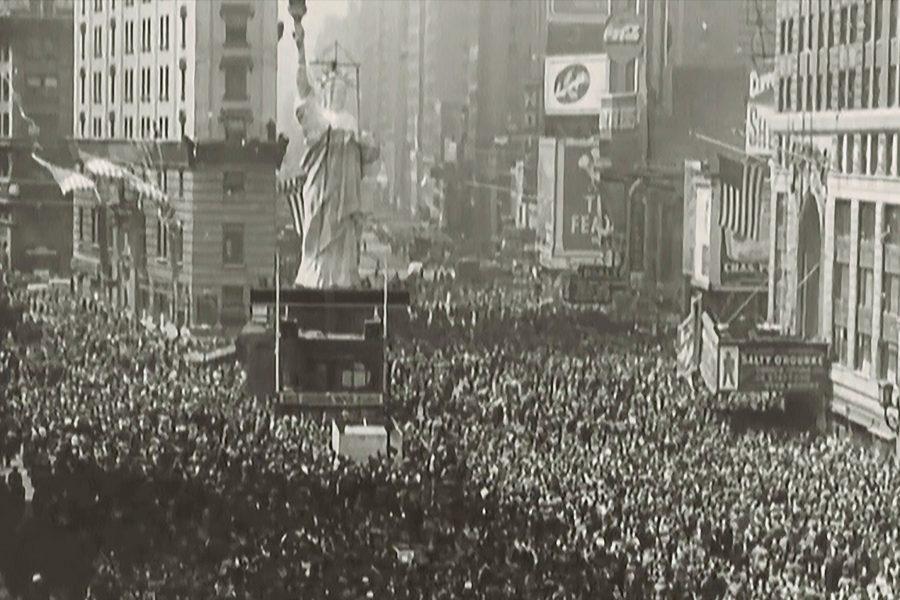May 8 marks the 75th anniversary of the official end of the war against Nazi Germany. In 1945, the Allied powers accepted unconditional surrender from representatives of Adm. Karl Dönitz, the hand-picked new leader of Germany upon the April 30 suicide of Adolf Hitler.
Hitler had begun the shooting war in September 1939 with a brutal and unprovoked attack on Poland. Soon after, he sent German forces throughout Europe, Scandinavia, North Africa, and the Middle East, rapidly consolidating his gains and, along with fascist Italy, creating “Fortress Europa.” However, his air campaign and planned invasion of Britain failed.
The United States formally entered the conflict on Dec. 8, 1941, after the Japanese attack on Pearl Harbor, Hawaii. Germany and Japan were allies, and Germany declared war on the U.S., only a few days after Congress declared war on the Axis powers.
Germany was deemed by the Allies to be the more urgent threat, given its closer geographical proximity to Allied capitals and more advanced military technology. Until Hitler was defeated, forces acting against the Nazis received priority for men and equipment. Italy surrendered in September 1943, and declared war on Germany a month later, although some Italian forces continued to fight under German command.

Upon news of Germany’s surrender, there were wild celebrations in the U.S., marked by huge crowds in places like New York’s Times Square. There were few reports of revelry among American forces on the front lines of Europe, though, where combat had been relentless since the June 6, 1944 D-Day landings, and even fewer in the Pacific theater, where the war against Japan still raged.
“Our rejoicing is sobered and subdued by a supreme consciousness of the terrible price we have paid to rid the world of Hitler and his evil band,” President Harry S. Truman said in announcing the German surrender. “Let us not forget, my fellow Americans, the sorrow and heartache which today abide in the homes of so many of our neighbors—neighbors whose most priceless possession has been rendered as a sacrifice to redeem our liberty.”
Truman urged the nation on to “work, work, and more work. We must work to finish the war. Our victory is only half over.”
Still ahead at that point was victory in the Philippines, on Okinawa, and the last push of the U.S. Army Air Forces bombing campaign against major Japanese cities, climaxing with the atomic bombs being used against Hiroshima and Nagasaki. Despite the massive destruction inflicted by the air campaign, factions of the Japanese military high command attempted a coup to continue the fight, but Emperor Hirohito capitulated on Aug. 15, 1945. The Japanese signed terms of surrender on Sept. 2, 1945. Both dates have been celebrated as Victory over Japan (V-J) Day, but the latter marked the formal end of WWII.
“Today, as we celebrate the 75th anniversary of the Allied victory in Europe during World War II, we honor the sacrifices of all those who served during this defining moment in human history,” Defense Secretary Mark Esper said in a release. “Although we face significant challenges with COVID-19, our commitment to remember the bravery and sacrifices of our WWII veterans will not change.”
Esper will speak at a virtual Victory in Europe Day commemoration alongside Chairman of the Joint Chiefs of Staff Gen. Mark Milley, ABC’s Robin Roberts, NBC’s Tom Brokaw, and Comedian Jay Leno. The event will be broadcast at 10:30 a.m. on defense.gov, as well as DOD’s Facebook and Twitter pages. The program also will be broadcast on the Smithsonian Channel at 8 p.m. on May 8.
Editor’s Note: This story was updated on May 8 at 11 a.m. EDT to correct the spelling of Hitler’s first name.
